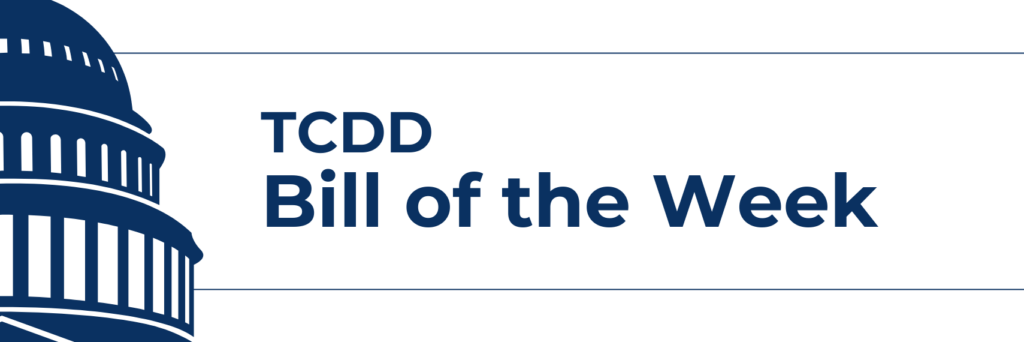
Table of Contents
Bill of the Week: HB 1063
House Bill (HB) 1063, relating to the creation of legal service offices by local governments to help low-income residential tenants in cases of eviction and disability-based discrimination. HB 1063 was authored by Rep. Salman Bhojani from Arlington, House District 92.Share This Bill
We’ve created a Bill of the Week one-pager (PDF) for HB 1063. This is a simplified explanation of the bill that you can share with your representative and personal network.Background
The federal Fair Housing Act is the primary housing law protecting people with disabilities, according to Disability Rights Texas. It prohibits landlords from discriminating against tenants based on disability. This is meant to ensure equal access to housing opportunities, including providing reasonable accommodation for tenants with disabilities. However, reports show that disabled renters often face higher rates of eviction and housing denial, as well as refusal to allow modifications to accommodate their needs. Only 4% of tenants facing eviction are represented by lawyers compared to 83% of landlords, as seen in data shared by the U.S. Department of Housing and Urban Development (PDF, 19 pages, 2.6 MB). This significant legal disparity contributes to a growing risk of displacement (PDF, 4 pages, 2.6 MB) for low-income individuals, including older adults, people with disabilities, and large segments of Texas’ most vulnerable populations. Advocates argue that without accessible legal support, tenants are unable to challenge discriminatory practices, leaving them vulnerable to housing instability and homelessness.What does the bill do?
HB 1063 would amend the local government code to allow local governments to establish tenant legal service offices. Specifically, tenant legal service offices would be:- Authorized to provide full legal representation to:
- indigent tenants in residential eviction cases, or
- low-income tenants with disabilities in cases involving discrimination based on disability.
- Allowed to offer brief legal assistance to low-income tenants in residential eviction cases.

“HB 1063 is a crucial step towards ensuring justice and fairness in our housing system. Without access to tenant legal services, disabled and low-income tenants are routinely taken advantage of in ways that lead to increased homelessness and cyclical housing instability.”
Rep. Salman Bhojani, HB 1063 author
Where is the bill in the process?
On March 7, 2025, HB 1063 was referred to the House Committee on Intergovernmental Affairs. The bill is waiting to be scheduled for a public hearing.
Who supports the bill and why?
The following comments were given as testimony at a hearing on April 5, 2023, on a bill nearly identical to HB 1063:
- Conference of Urban Counties: Adam Haynes, policy director for the Texas Conference of Urban Counties, testified in favor of the bill. He highlighted that the bill gives discretion to counties to implement tenant legal service offices. If counties choose to do so, the bill works to guide them in establishing the service. He also explained that the bill does not override the minimum standards for evictions or for tenant refusal to pay. These standards would be unaffected by the bill.
- Advocates for Disability Access: John Woodley, a self-advocate and member of Advocates for Disability Access, testified in favor of the bill. Woodley emphasized his concern over the growing number of evictions of people with disabilities without due process. He recounted his experiences as both the son of a mother with disabilities and as someone with a disability himself, detailing how landlords often infringed on the rights of people with disabilities and utilized illegal forms of retaliation. He suggested that, despite awareness of serious infringements, the Texas Department of Housing has few enforcement mechanisms and limited resources available to provide legal aid to those in need. Woodley indicated that the bill would allow local governments to better protect vulnerable individuals, giving tenants a chance to advocate for their housing rights and ensure fair treatment under the law.
The following groups also registered their support for the bill but provided no testimony: ADAPT of Texas, City of Austin, City of Fort Worth, City of Houston Mayor’s Office, City of San Antonio, Disability Rights Texas, Institute for Disability Access, Personal Attendant Coalition of Texas, Texas Homeless Network, Texas Press Association, Travis County Commissioners Court, and Vivent Health.
Who opposes the bill and why?
No testimony was provided in opposition to the bill at the 2023 hearing.
Additional Testimony
TCDD has identified personal and civil rights as one of its public policy priorities for the 89th Texas Legislature:
Texans with disabilities deserve to understand and exercise their personal and civil rights in order to lead safe and successful lives as independently as possible, and they deserve equal protection when their rights are infringed upon.
How much will the bill cost?
In 2023, the Legislative Budget Board found that a bill nearly identical to HB 1063 would have no impact on the state budget.
Is there a Senate companion to the bill?
There is no Senate companion to HB 1063.
Stay Informed
For the latest information about where HB 1063 is in the process, follow the bill on the Texas Legislature Online. To receive future legislative updates from TCDD, follow us on Facebook, X, Instagram, and LinkedIn.
Bill of the Week Updates
Here is an update on previous TCDD Bills of the Week for the 89th legislative session.
HB 645 has been scheduled for a hearing on March 18 by the House Committee on Human Services. The bill would require the implementation of a statewide program to provide certain co-navigation services to people who are deaf-blind.
